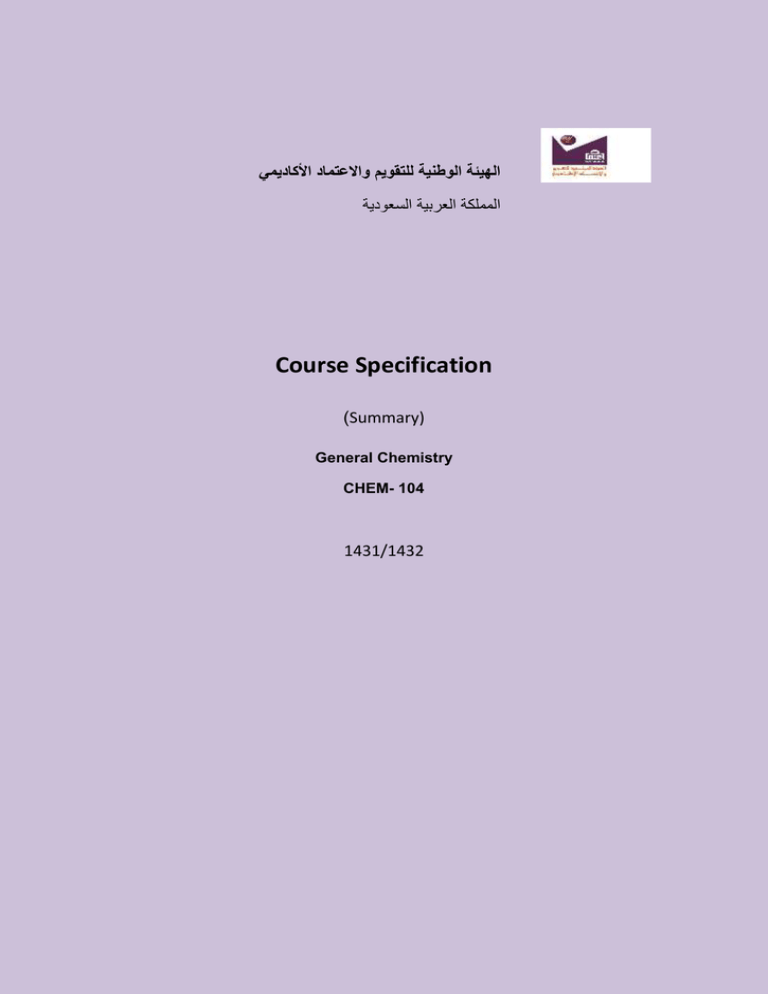
الهيئة الوطنية للتقويم واالعتماد األكاديمي
المملكة العربية السعودية
Course Specification
))Summary
General Chemistry
CHEM- 104
1431/1432
Course Specification
Institution: Majmaa university
College/Department: College of Science in Zulfi – Medical Laboratories department
A- Course Identification and General Information:
1. Course title and code:
2. Credit hours:
CHEM-104
3 (2 +1)
4. Name of faculty member responsible for the course: Dr. Ahmed Khamis Salama
5. Level/year at which this course is offered:
1st level
6. Co-requisites for this course (if any): preparatory year
7. Location if not on main campus: College of Science in Zulfi
B- Objectives
1. Summary of the main learning outcomes for students enrolled in the course.
Atomic theory, Chemical bonding, Concept of moles, Chemical reactions in aqueous
solutions, Acids and bases , Thermal chemistry, Solutions, Chemical equilibrium and
Chemical kinetics. Qualitative analysis of elements, Identification of basic and acid
radicals.
By the end of this course, student should be able to:
- Describe the atomic structure and define atomic number, mass number and
isotopes
- Know chemical and physical bonding and their properties
- Know types of chemical reactions and concept of rate of reaction
- Know mole, molar mass, molarity and molality and their use in laboratory
- Know oxidation-reduction reactions
- Know different types of solutions and solubility
- Define acids, bases and describe acid-base reactions
- Understand concept of pH and its calculations
- Know buffers and their types
- Know activation energy and endothermic and exothermic reactions
- Know 1st and 2nd law of thermodynamics and chemical equilibrium
- Identification of basic and acidic radicals
C- Course Description (Note: General description in the form to be used for the Bulletin or
Handbook should be attached)
1. Topics to be Covered
List of Topics
No of
Weeks
1
1
1
2
1
1
2
2
3
Atomic theory
Chemical bonding
Mole concept
Chemical reactions
Solutions
Acids and bases
Chemical equilibrium
Thermochemistry
Chemical kinetics
Contact
hours
3
3
3
6
3
3
6
6
9
2. Course components (total contact hours per semester):
Lecture: 28
Tutorial:
Laboratory: 28 Practical/Field
work/Internship
Other:
3. Additional private study/learning hours expected for students per week. (This
should be an average :for the semester not a specific requirement in each week) : 14
hrs through visiting specific websites for General Chemistry to answer some
questions related to the course topics.
4. Schedule of Assessment Tasks for Students During the Semester
Degree
week
assessment
Degree
week
assessment
20
15
Practical exam
15
6
1st midterm exam
50
16
Final exam
15
12
2nd midterm exam
D- E Learning Resources.
Required Text(s):
Lectures and the hand out
2. Essential References
- General Chemistry, John McMurry, Robert Fay International Edition Mar
2009, Paperback, 1056 pages .
- John W. Hill, Ralph H. Petrucci, Terry W. McCreary, and Scott S. Perry. General
Chemistry, 4th edition, Pearson / Prentice Hall Publishing Company, New Jersey 2005.
- Berry, S. R., Rice, S. A, Ross, J. (2000). Physical Chemistry 2nd ed. Oxford University
Press.
- Masterton, W.L. and Hurley, C.N. (1997): Chemistry- Principles & reactions. Saunders
College publishing, USA, London, Sydney, Tokyo
3- Recommended Books and Reference Material (Journals, Reports, etc) (Attach List)
1. Levine, I. N. (1978). Physical Chemistry McGraw-Hill publishing
2. Atkins, P.W. (1978). Physical Chemistry Oxford University Press
3. Hunter, R. J. (1993) Introduction to Modern Colloid Science Oxford University Press.
4-.Electronic Materials, Web Sites
http://en.wikipedia.org/wiki/Physical_chemistry
http://en.wikipedia.org/wiki/Chemical_kinetics
http://www.thermochemistry.net
5- Other learning material such as computer-based programs/CD, professional standards/regulations
E- Assessment
- Mid-Term exams and practical exam
- Final Exam
50%
50%



